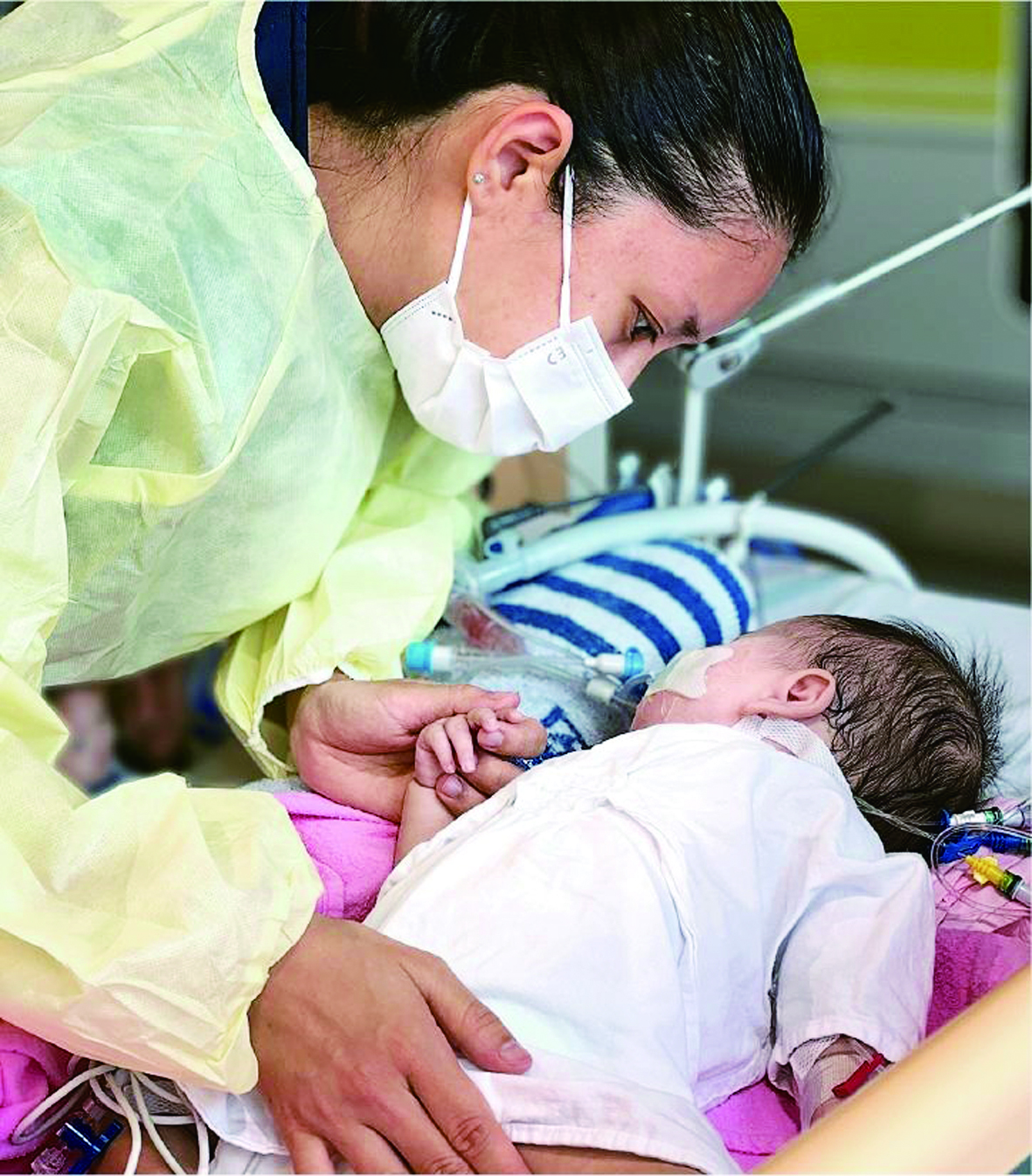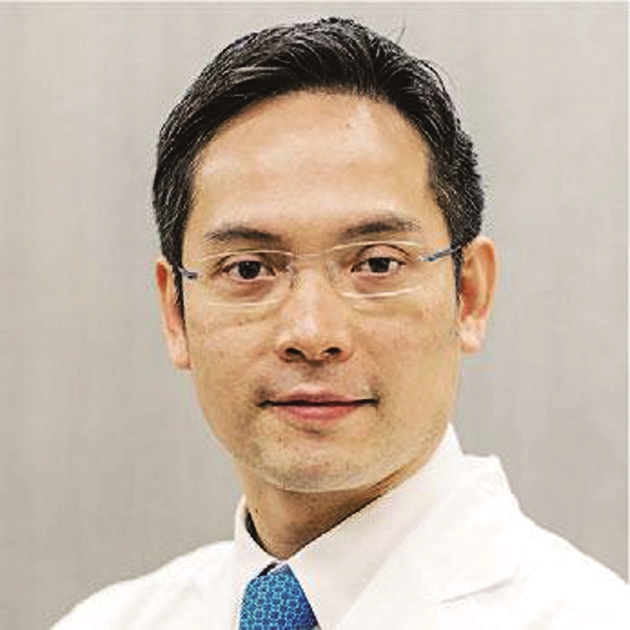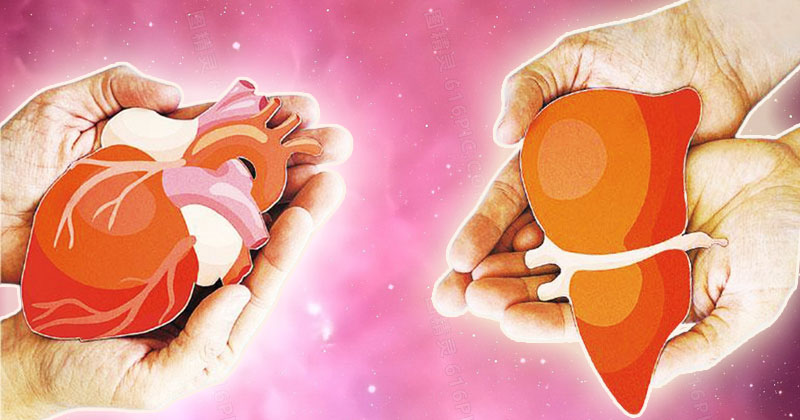Expand the scope of matching and shorten the waiting time for cross-border device donation patients see the light of day
[ad_1]
Text: Zhang Shumei, Chen Zhenji “Ming Pao”
(Hong Kong News) At the end of last year, Hong Kong completed the first organ transplant operation from China, a heart transplant for a baby girl Zhixi suffering from acute heart failure.
Recently, the two places have established a mutual assistance mechanism for regular organ transplantation, and discussions are in full swing.
However, many people have many doubts about the source of organs in China and the implementation details of cross-border donations.
There are long queues on the waiting list for organs in Hong Kong. If the two places establish a mutual assistance mechanism for organ transplantation, will the probability of successful matching of local patients be changed? Which patients are most likely to benefit?
According to data from the Hospital Authority as of the end of March this year, more than 2,900 people in Hong Kong are waiting for organ transplants, with the largest number of people waiting for kidney transplants.
According to the data submitted by the Hospital Authority to the Legislative Council, as of the end of last year, there were 2,451 patients waiting for kidney transplantation, but only 45 remains and 11 living kidneys were donated last year, the lowest in the past five years, and the average waiting time for patients for 56.8 months.
It is difficult for 3 types of people to match suitable organs
“Why cross-border organ transplants? The number of people who are willing to donate organs is small, which is the case all over the world, and among the waiting queues, it is particularly difficult for some patients to find suitable organs.”
He Jiliang, the founding chairman of the Hong Kong Organ Transplant Foundation and a specialist in nephrology, said that there are three types of patients who are difficult to match with suitable organs. Through the organ transplant mutual aid mechanism, it is hoped that their waiting time can be shortened.
Children: Organ transplantation needs to match the blood type, human leukocyte antigen (HLA), organ size, etc. The antigens match, but (the organ) is too large, not suitable for children.”
The success rate of pairing in a single region is low
People with high HLA antibodies and a higher risk of transplant rejection: Before transplantation, patients must undergo HLA testing. If the HLA match between the recipient and the donor is higher, the probability of rejection after organ transplantation will be lower. However, some patients who have undergone multiple blood transfusions, are pregnant or have received organ transplants may have higher levels of HLA antibodies in their bodies and are more likely to have a rejection reaction to donor organs. Therefore, it is more difficult to match organs.
Critically ill patients: patients who will die quickly without an organ transplant, such as patients with acute heart failure or acute liver failure.
Taking the liver as an example, Chen Zhiren, clinical professor of surgery at the University of Hong Kong and director of the Liver Transplantation Center at Queen Mary Hospital, pointed out that there is no effective external device in medicine to maintain liver function, and patients with liver failure have only one way to do it is to replace the liver. When patients with hepatitis B face acute liver failure, some may be so critical that they only have one week of golden treatment time left. “If you miss it, your own organs will fail or become infected, and the success rate of transplantation will be greatly reduced.”
The condition of patients with liver cancer can also deteriorate at any time, making them ineligible for liver transplantation and eventually being removed from the waiting list. Therefore, for these patients, organ transplantation is urgent.
He Jiliang pointed out that people who are limited to a single region donate organs will have a much lower chance of successful matching; if the pool size can be increased, the more places join the pool, the larger the pool size, and the more special needs (organs) can be matched. many.
The case needs to be approved by the transplant committee
There are long queues on the organ waiting list in Hong Kong. Will more organs be donated to the mainland? Checking the information, Hong Kong has tried to donate organs to other regions in the past.
For example, He Jiliang pointed out that (2010) Princess Margaret Hospital in Hong Kong had a liver with AB blood type, because it could only be given to people with AB blood type, and no one in Hong Kong was suitable. At that time, it was donated to Changyu Memorial Hospital in Kaohsiung, Taiwan; another happened in 2016 In 2010, he also donated a liver with AB blood type to Kaohsiung Changyu Memorial Hospital. In 1999, Hong Kong also accepted a liver donated by Kaohsiung Chang Gung Memorial Hospital to save a taxi driver.
He Jiliang said that because there is currently no formal mechanism for Hong Kong to share donated organs with overseas medical institutions, every time a relevant case occurs, it needs to be approved by the Human Organ Transplantation Committee according to the situation, such as whether the case involves organ trading. It takes a certain amount of time to convene committee meetings, arrange transportation, and process organ transit. “There is a golden time for organ transplants. Livers, lungs, hearts, etc. cannot wait too long. If there is a permanent mechanism and all procedures are clear, it can be done as soon as possible.” arrange.”

Dr. He Jiliang
Mechanism is most difficult for citizens to understand
Chen Zhiren said that there is a “guarantee period” for organs. After the organs are taken out from the donor, they need to go through a series of procedures and transportation, which can easily exceed the warranty period. For example, the quality of organs transported from remote areas may have deteriorated. May not work after transplantation.
Take the liver as an example, from the moment the blood supply is cut off from the human body, the liver is in a state of ischemia, and the liver cells begin to be damaged, and can only survive for 6 hours at most. Seriously, even if the blood supply is resupplied, the liver cells may not recover, and the liver function may not be 100% improved.”
Based on the above considerations, it is more practical and feasible to limit organ exchange to the Greater Bay Area or South China.
He Jiliang believes that the most difficult thing for the whole mechanism is to gain the understanding and support of the citizens. He suggested that the organ allocation system should be clearly formulated, such as scoring methods, implementation methods, etc., and transparency should be increased, and people from different sectors should be added to monitor; Relevant organizations may also include NGOs and independent individuals such as lawyers, professionals, etc. “The whole system covers people from different sectors, so there will be no black market operation, which can reduce the worries of the public.”



Chen Zhiren
cardiac death donor
An extra layer of medical procedures
There are roughly two types of organ donors, one is brainstem death donation, and the second is heart death donation.
Chen Zhiren, director of the Liver Transplantation Center of Queen Mary Hospital, said that each place has different criteria for accepting organ donors. Hong Kong accepts organs from brain-stem death, while the mainland and many European countries accept organ donations from brain-stem death or heart death. .
Donation surgery can be arranged immediately for brain dead
Medically, brainstem death only means that the central system of the brain has lost its function, but other organs including the heart can still function normally. Once the family members agree to donate organs, the donation operation can be arranged immediately.
Donors who died of heart disease need to do more medical procedures before donation. When the heart starts to stop, they need to use machines and drugs to maintain blood pressure and keep the blood with enough oxygen to supply other organs, so as to ensure the transplanted organs can continue to function normally.



European cross-border organ distribution according to patient urgency
Europe has long practiced cross-border organ distribution.
He Jiliang, the founding chairman of the Hong Kong Organ Transplant Foundation, pointed out that there are three main organizations in Europe dealing with cross-border organ distribution, the largest of which is the South Alliance for Transplants, which consists of France, Italy, Portugal, Spain and Switzerland, and the Czech Republic as an observer Join, covering 200 million people.
Followed by Eurotransplant, the member states are Austria, Belgium, Croatia, Germany, Hungary, Luxembourg, the Netherlands and Slovenia, covering about 137 million people. Scandiatransplant consists of Denmark, Finland, Iceland, Norway, Sweden and Estonia, covering about 30 million people.
The organization signed agreements with 17 countries at the same time
Taking Eurotransplant as an example, last year it handled 6,454 cases of organ transplantation from remains. As of the end of last year, there were 13,276 people on the waiting list for organ transplants. Eurotransplant has set up multiple 24-hour transplant centers in member states, which are on call around the clock; the organizations will be sorted according to the urgency of the patients, and the central system will use an algorithm to formulate an organ matching list.
Organ allocation is divided into 3 layers:
Tier 1: Patients most urgently in need of organ transplantation in member states
Tier 2: Patients in the country of the donor
Tier 3: other patients in member states
In addition, the organization signed agreements with 17 countries at the same time, and if there are no suitable patients in the member countries, the organs will be transferred to the agreement countries.
When there is an organ donation, the organization will contact the transplant centers of the first and second patients on the list. When the matching is successful, the donor’s hospital and transplant center will contact and arrange for organ delivery at the same time, such as involving cross-border organ transplants , or will be transported by helicopter or aircraft.
Nearly half of the organs came from other countries
Last year, 21.6% of Eurotransplant’s organs were assigned to patients from countries other than the donor’s. The website of the organization pointed out that cross-border organ transplants are mainly for patients with special needs, including children, acute organ failure, and complicated diseases. In these cases, nearly half of the organs All of them came from other countries. Taking pediatric patients as an example, 47.3% of the recipients’ organs came from other countries.

8 major Q&A dismantling
Donation Age Willingness Conditions
According to the records of the Hospital Authority, more than 2,000 patients in Hong Kong are waiting for organ transplants every day, and the mutual aid mechanism for cross-border organ transplants has also attracted attention.
The Hong Kong government stated that the number of deregistrations on the Central Organ Donation Register website is unusual. From December last year to April this year, there were 5,785 applications for deregistration, which is much higher than the previous figures.
Based on the information from the Department of Health and the Hong Kong Organ Transplant Foundation, the following are 8 common questions people have about organ donation, including donation age and conditions.
Q1/What is the process of organ donation?
1/Using “brain death” as the criterion for organ donation in medicine
2/The medical team will assess whether the deceased is suitable for organ donation
3/ The organ donation liaison officer communicates with the family members and provides care and counseling.
4/ The medical team assesses and maintains organ function in the brain-dead
5/ From the following channels, confirm whether the deceased has expressed his willingness to donate organs:
◆Check the “Central Organ Donation Register” computer system
◆Check the signed organ donation certificate
◆Inquiries from family members
6/ Obtain the consent of the patient’s family for organ donation
7/ Carry out relevant inspections and matching to determine suitable organs for donation
8/ Arranging organ/tissue harvesting and transplantation
9/The body was sent back to the ward
10/ The organ donation liaison officer will accompany the family members to bid farewell to the donated deceased
Q2/Is there any age limit for organ donation?
Generally speaking, there is no age limit for organ donation. People from birth to 75 years old are generally suitable for organ donation. As for the donation of various tissues, corneas are under 80 years old, long bones are 16 to 60 years old, and skin is 10 years old. or above.
The transplant medical team evaluates each donor before deciding whether their organs are suitable for use.
Q3/ Only those who are completely healthy can donate organs?
Most people, including those with brain cancer whose tumor has not spread, can donate organs or tissues after death. Although cancer patients are generally not suitable for organ donation, they can still donate their corneas after death.
The transplant medical team evaluates each donor before making a decision.
Q4/If you have registered as an organ donorIn case of an accident, will the rescue be given up?
Saving the lives of patients is the primary responsibility of every medical staff. The medical team will only consider whether the patient is suitable for organ donation after the patient is confirmed dead or judged to be brain dead.
Q5/Will the medical staff ignore my instructions,Take all my organs?
Those who wish to donate their organs after death can specify which organ or tissue they would like to donate on the Central Organ Donation Register or the Organ Donation Certificate. Before the donation operation, the family members of the deceased must also sign a consent form, confirming which organs or tissues are donated for transplantation.
Q6/ For those who intend to donate organs, do they need to tell their family members about their wishes?
When a patient dies, the medical team needs the written consent of the family to perform organ donation. Everyone can make good use of some opportunities in daily life, such as discussing with family members when seeing news or promotional videos about organ donation.
Q7/Does the procedure of organ donation include medical expenses?
According to the Hong Kong Organ Transplant Foundation, regardless of whether it is body donation or living donation (except for private hospital services), the family members of the donor are not responsible for the expenses incurred by donating organs after death.
Q8/If I have registered to donate the whole body, is it not suitable to donate organs?
In general, organ donation does not conflict with cadaver donation programs. The Body Donation Program of the Faculty of Biomedical Sciences of the University of Hong Kong and the “Silence Teacher” program of the Faculty of Medicine of the Chinese University of Hong Kong will respectively accept the remains of donated organs for teaching purposes.
[ad_2]
Source link

![[Love Wants Sexual Happiness Series 358]Find the culprit and overcome psychogenic erectile dysfunction. Don’t let pressure affect your sexual happiness.](https://chinathenews.com/wp-content/uploads/2024/04/171111-780x420.jpg)

![[Wanqingyi Care]My health, my rights, customized medical methods in the last stage of life](https://chinathenews.com/wp-content/uploads/2024/04/ZZ1-100-780x420.jpg)
![[Kidney Transplantation Special Topic]The survival rate of transplanted kidneys is high without dialysis treatment three times a week](https://chinathenews.com/wp-content/uploads/2024/04/1311-780x420.jpg)



